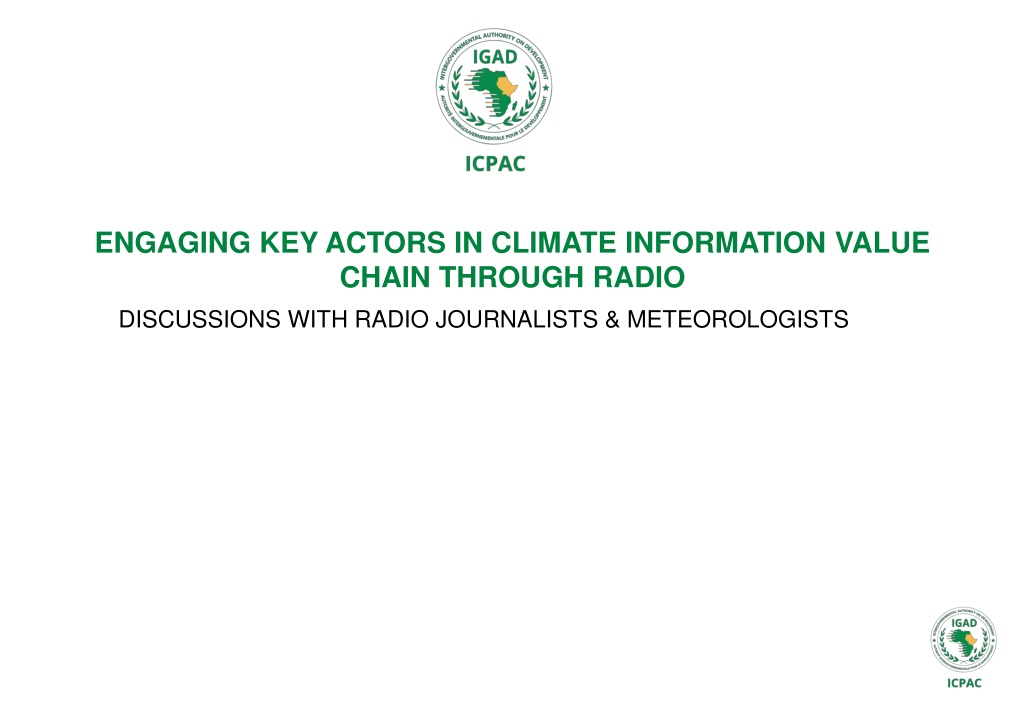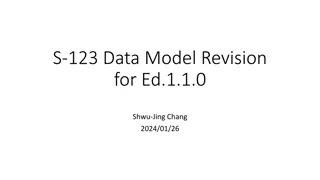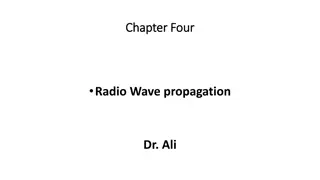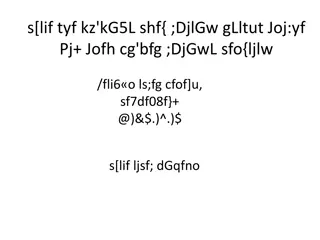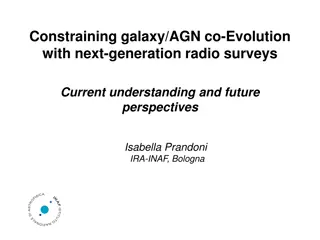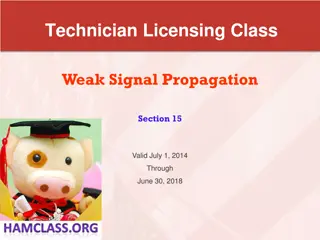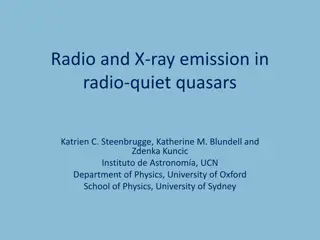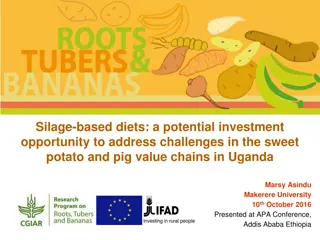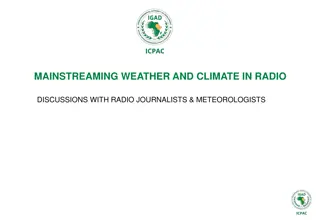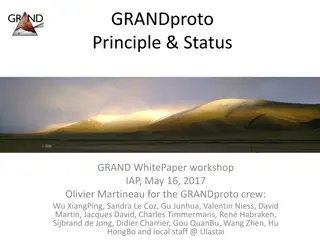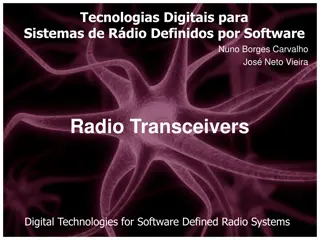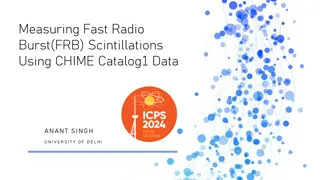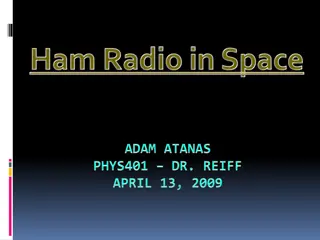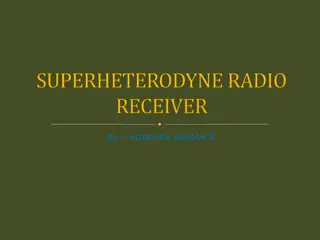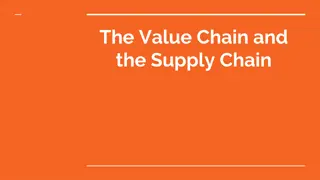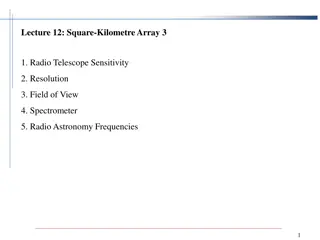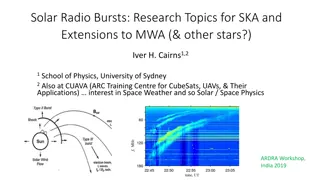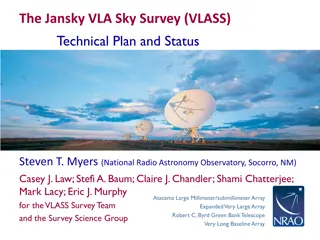Engaging Key Actors in Climate Information Value Chain Through Radio Discussions
In this discussion, the importance of engaging key actors along the climate information value chain through radio discussions is emphasized. The symbiotic relationship between radio journalists and meteorological authorities is highlighted, as well as the key actors involved such as Government Agencies, Civil Society, Private Sector, and Communities. The integration of information needs into the radio reporting ecosystem and the toolbox for radio actors' engagement are also discussed.
Download Presentation

Please find below an Image/Link to download the presentation.
The content on the website is provided AS IS for your information and personal use only. It may not be sold, licensed, or shared on other websites without obtaining consent from the author. Download presentation by click this link. If you encounter any issues during the download, it is possible that the publisher has removed the file from their server.
E N D
Presentation Transcript
ENGAGING KEY ACTORS IN CLIMATE INFORMATION VALUE CHAIN THROUGH RADIO DISCUSSIONS WITH RADIO JOURNALISTS & METEOROLOGISTS
ENGAGING KEY ACTORS IN CLIMATE INFORMATION VALUE CHAIN THROUGH RADIO Introduction One of the principal roles of the National Meteorological and Hydrological Services (NMHS) is to provide to the general public, and also to more specialized users, reliable and accurate weather products and services. These products and services help to ensure the safety and protection of people and of goods at times of occurrence of extreme weather phenomena, but also assist in the efficient and economic pursuit of business and of the domestic activity of citizens engaged in their own particular areas of pursuit and responsibility. Monday, September 16, 2024 IGAD CLIMATE PREDICTION AND APPLICATIONS CENTRE (ICPAC) 2
ENGAGING KEY ACTORS IN CLIMATE INFORMATION VALUE CHAIN THROUGH RADIO Monday, September 16, 2024 IGAD CLIMATE PREDICTION AND APPLICATIONS CENTRE (ICPAC) 3
ENGAGING KEY ACTORS IN CLIMATE INFORMATION VALUE CHAIN THROUGH RADIO Actors Key actors along the value chain include; Government Agencies, Civil Society, Private Sector and Communities. These actors are related and it is essential to develop an approach that integrates their information needs into the radio reporting ecosystem. A symbiotic relationship therefore ought to be built between the radio and the meteorological authorities. In taking cognizance of the high level perishability of weather and climate information and the absorption methods it is essential that radio journalists engage effectively with all key actors along the weather and climate information value chain. Monday, September 16, 2024 IGAD CLIMATE PREDICTION AND APPLICATIONS CENTRE (ICPAC) 4
ENGAGING KEY ACTORS IN CLIMATE INFORMATION VALUE CHAIN THROUGH RADIO Monday, September 16, 2024 IGAD CLIMATE PREDICTION AND APPLICATIONS CENTRE (ICPAC) 5
ENGAGING KEY ACTORS IN CLIMATE INFORMATION VALUE CHAIN THROUGH RADIO RADIO ACTOR S ENGAGEMENT TOOLBOX Owing to the diverse actors along the climate information value chain, engagement in weather and climate is not generally driven by a model so much as by a framework of guiding principles, strategies, and approaches. This framework is based on principles that respect the right of all weather and climate value chain actors to be informed, consulted, involved and empowered and employs and range of tools and strategies to ensure success. It also places a premium on fostering and enhancing trust as a critical element in long-term, sustainable engagement and effective governance. Monday, September 16, 2024 IGAD CLIMATE PREDICTION AND APPLICATIONS CENTRE (ICPAC) 6
ENGAGING KEY ACTORS IN CLIMATE INFORMATION VALUE CHAIN THROUGH RADIO Monday, September 16, 2024 IGAD CLIMATE PREDICTION AND APPLICATIONS CENTRE (ICPAC) 7
ENGAGING KEY ACTORS IN CLIMATE INFORMATION VALUE CHAIN THROUGH RADIO ENGAGEMENT TOOLS The tools and resources in today s discussion are intended to support radio journalists to engage effectively with stakeholders along the weather and climate information value chain. As a radio journalist you may also assess your engagement needs, plan for effective strategies and processes, as well as implement and monitor your engagement efforts. All in the context of weather and climate. This presentation focuses on 12 tools to engage weather and climate actors in radio. No one tool, serves all, they need to be used strategically. Monday, September 16, 2024 IGAD CLIMATE PREDICTION AND APPLICATIONS CENTRE (ICPAC) 8
Monday, September 16, 2024 IGAD CLIMATE PREDICTION AND APPLICATIONS CENTRE (ICPAC) 9
ENGAGING KEY ACTORS IN CLIMATE INFORMATION VALUE CHAIN THROUGH RADIO GOVERNMENT INVOLVEMENT In the IGAD region generally, governments are mandated to provide weather and climate services. Prior to using any weather and climate information, it is important for the radio journalist to gauge if the government (at any level is involved). This is important because it provides two critical avenues; firstly for authenticity and secondly for accountability. Monday, September 16, 2024 IGAD CLIMATE PREDICTION AND APPLICATIONS CENTRE (ICPAC) 10
ENGAGING KEY ACTORS IN CLIMATE INFORMATION VALUE CHAIN THROUGH RADIO GOVERNANCE ARRANGEMENTS The governance structure of countries in the IGAD region varies. Some member states have centralized systems of governance, others are federal, others have varying levels of governance. It is vital that the radio journalists understands the governance structure to be able to hold the relevant duty bearers to account and provide targeted information and possible solutions in the context of weather and climate. Monday, September 16, 2024 IGAD CLIMATE PREDICTION AND APPLICATIONS CENTRE (ICPAC) 11
ENGAGING KEY ACTORS IN CLIMATE INFORMATION VALUE CHAIN THROUGH RADIO POLICIES & REGULATIONS Radio journalists need to understand the policies and regulations governing weather and climate issues and how key actors such as civil society organizations interact with these policies and regulations & most significantly how these policies impact on the end users of climate services. Climate-change policy encompasses policies formulated specifically to tackle climate change and can be local, national or international in scope. Monday, September 16, 2024 IGAD CLIMATE PREDICTION AND APPLICATIONS CENTRE (ICPAC) 12
ENGAGING KEY ACTORS IN CLIMATE INFORMATION VALUE CHAIN THROUGH RADIO YESTERDAY, TODAY & TOMMOROW Weather forecasts are not standalone products. They ought to be viewed in context and in totality. The seasonal forecast for instance is not an end in itself. It is important that the forecasts be viewed along with the updates. The radio journalist should thus develop a continuum way of interacting with the forecast. Furthermore, radio journalists should interrogate the products and services to ensure that they respond to the needs of the targeted users. Monday, September 16, 2024 IGAD CLIMATE PREDICTION AND APPLICATIONS CENTRE (ICPAC) 13
ENGAGING KEY ACTORS IN CLIMATE INFORMATION VALUE CHAIN THROUGH RADIO TWO WAY COMMUNICATION Two-way communication involves feedback from the receiver to the sender. This allows the sender to know the message was received accurately by the receiver. Communication is also negotiated which means that the sender and receiver listen to each other, the messages then gathers information to respond. Presenting the forecast and other weather and climate products on radio is served best by end users calling and providing feedback with the relevant stakeholders responding. Monday, September 16, 2024 IGAD CLIMATE PREDICTION AND APPLICATIONS CENTRE (ICPAC) 14
ENGAGING KEY ACTORS IN CLIMATE INFORMATION VALUE CHAIN THROUGH RADIO TECHNOLOGY ASSUMPTIONS It is easy to assume universal access in terms of SMS and Social Media. Radio journalist must always consider that even where SMS are sent the recipients may not necessarily be able to read and write. That not all users have access to WhatsApp. These assumptions sometimes also affect radio journalists in remote areas where the internet link is not strong. Assumptions go beyond applications and also into devices as well, types of phones etc. Monday, September 16, 2024 IGAD CLIMATE PREDICTION AND APPLICATIONS CENTRE (ICPAC) 15
ENGAGING KEY ACTORS IN CLIMATE INFORMATION VALUE CHAIN THROUGH RADIO UNREALISTIC EXPECTATIONS Where the seasonal forecast is of adequate rains, the expectations of herders and farmers are sometimes high, particularly when echoed by radio journalists. Radio journalists must therefore diversify the discussions from meteorologists to include agro input dealers, agriculture and livestock experts. This will ensure that any unrealistic expectations are reduced. Where possible participate in community meetings and ask public questions on the season. Monday, September 16, 2024 IGAD CLIMATE PREDICTION AND APPLICATIONS CENTRE (ICPAC) 16
ENGAGING KEY ACTORS IN CLIMATE INFORMATION VALUE CHAIN THROUGH RADIO EQUITY IN RADIO The term equity refers to fairness and justice and is distinguished from equality: Whereas equality means providing the same to all, equity means recognizing that we do not all start from the same place and must acknowledge and make adjustments to imbalances. The process is ongoing, requiring us to identify and overcome intentional and unintentional barriers arising from bias or systemic structures. Radio journalists should know that programmes targeting women need to be fashioned on a manner that they can actually listen to and implement practically. Currently the radio journalists operate significantly on equality yet there are opportunities for equity in women and youth areas. Monday, September 16, 2024 IGAD CLIMATE PREDICTION AND APPLICATIONS CENTRE (ICPAC) 17
ENGAGING KEY ACTORS IN CLIMATE INFORMATION VALUE CHAIN THROUGH RADIO WHY WOMEN? Anecdotal evidence indicates that current weather and climate radio programs rarely discuss or represent the variety of roles women play in agricultural production and marketing. Women often lead household production, while men manage cash crops, but this is not always the case, as these roles are dynamic and transforming. Women often lead community, household and income activities bearing a triple burden of responsibility with little leisure time to pursue skills and learning activities. Yet the division of labour between men and women within and outside the household is a topic not often discussed, more so, in the context of weather and climate. Monday, September 16, 2024 IGAD CLIMATE PREDICTION AND APPLICATIONS CENTRE (ICPAC) 18
ENGAGING KEY ACTORS IN CLIMATE INFORMATION VALUE CHAIN THROUGH RADIO CULTURE, ETHNICITY & RELIGION It is essential that the radio journalists interact and engage with three types of leaders depending on the context in terms of weather and climate, Cultural Leaders Community Leaders Religious Leaders Having a broad buy-in of weather and climate radio programming that involves them boosts both rating and credibility. Monday, September 16, 2024 IGAD CLIMATE PREDICTION AND APPLICATIONS CENTRE (ICPAC) 19
ENGAGING KEY ACTORS IN CLIMATE INFORMATION VALUE CHAIN THROUGH RADIO COMMUNITY VIEWS The feedback provided to weather and climate related radio shows should not constitute the entire set of community views. As earlier noted the use of approaches such as vox pop to promote weather and climate information engagement at the grassroots levels and beyond. These vox pops can be shared with meteorologists and other stakeholders who in turn respond and hence complete the feedback loop. Monday, September 16, 2024 IGAD CLIMATE PREDICTION AND APPLICATIONS CENTRE (ICPAC) 20
ENGAGING KEY ACTORS IN CLIMATE INFORMATION VALUE CHAIN THROUGH RADIO ACCOUNTABILITY In all these tools, it is essential to inbuild an element of accountability. This is because accountability forms a vital centre piece of any reporting by a radio journalist. It offers a fallback position when questions are brought up concerning a report broadcast on radio. All actors along the value chain should be both engaged and held to account. Monday, September 16, 2024 IGAD CLIMATE PREDICTION AND APPLICATIONS CENTRE (ICPAC) 21
THANK YOU! www.icpac.net Monday, September 16, 2024 IGAD CLIMATE PREDICTION AND APPLICATIONS CENTRE (ICPAC) 22
